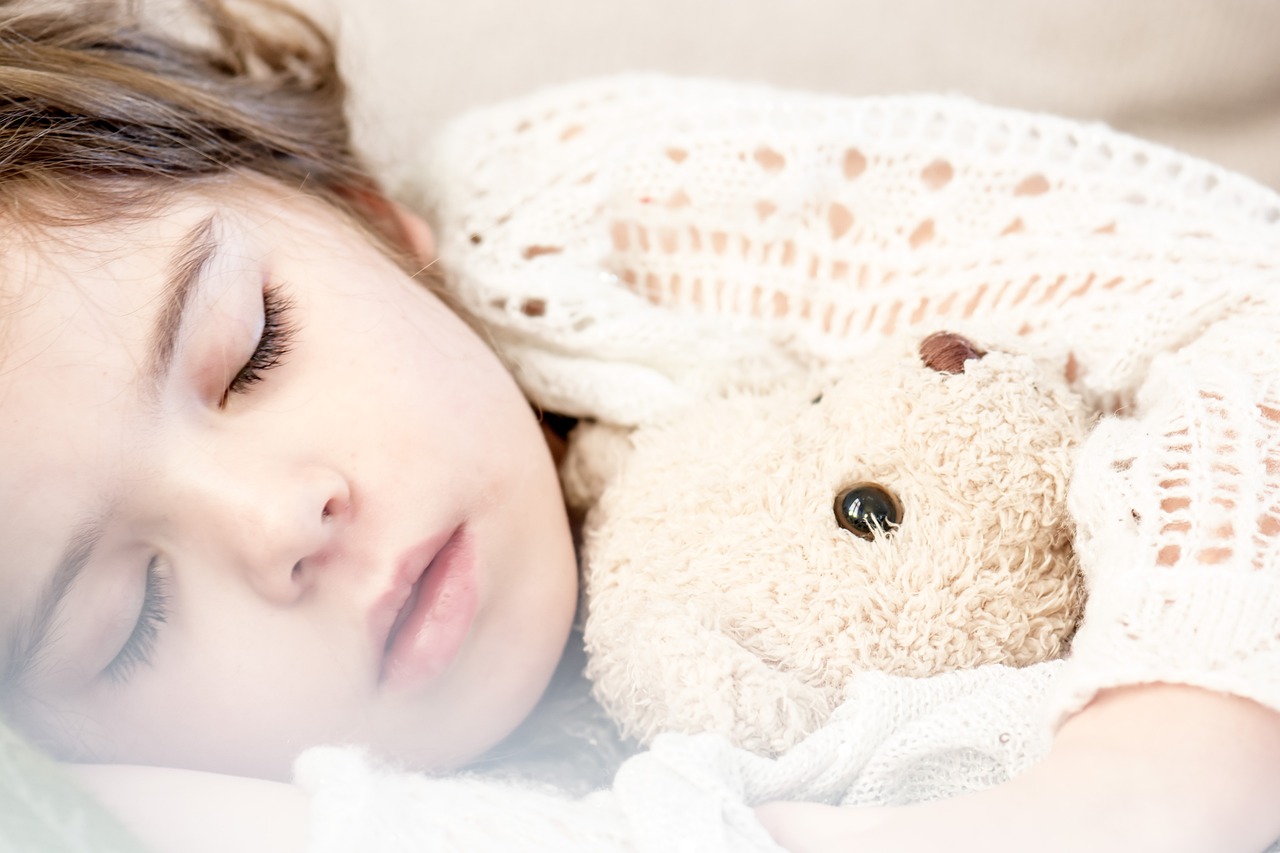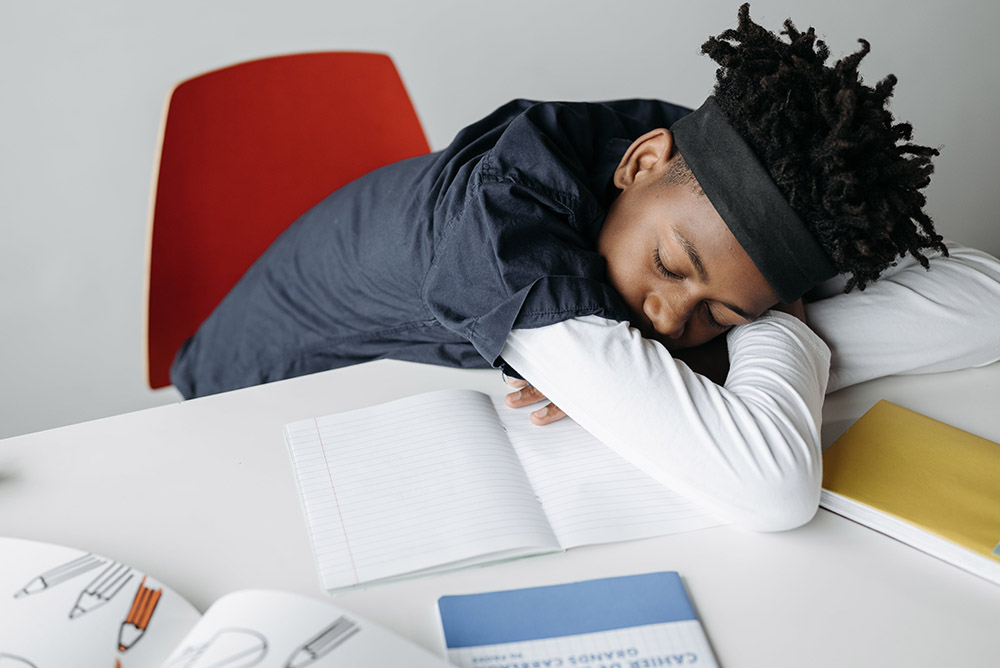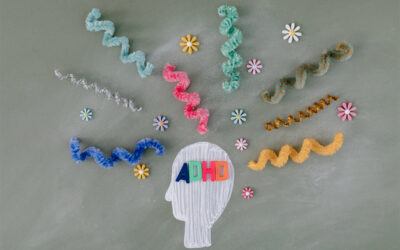Most parents have to deal with bedtime-stalling tactics and occasional sleep problems from their child or teen.
But, sleep issues can be a regular challenge for children and teens with attention deficit hyperactivity disorder (ADHD). Studies suggest that about 50% of parents of children and teens with ADHD report problems with their child’s sleep [1]. Additionally, these sleep problems can negatively impact their daily life, mood, behaviours, and health.
The child or teen’s sleep issues can also affect other family members, like parents or caregivers being late for work, having less sleep, and experiencing increased stress.
Parents of children and teens with ADHD report more sleep issues than expected for their child’s age. Parents can help their child and teen develop routines and sleep hygiene habits that will help them sleep better. So your child or teen gets the quality sleep they need to perform and feel at their best.
Does poor sleep impact your child or teen’s daily functioning?
Sleep problems in children and teens with ADHD can significantly impact their mood, daily functioning, health, and overall quality of life.
For example, children and teens with ADHD who also experience ongoing sleep issues may struggle with:
- Daytime sleepiness, which can impact their concentration, alertness, and focus at school, during extracurricular activities, and at home
- Getting to school on time because of trouble waking up in the morning
- Increased moodiness, anxiety, or depression
- Increased stress
- Irritability
- Restlessness
Additionally, chronic sleep problems may also exacerbate some ADHD symptoms, like inattention, hyperactivity, and difficulty processing information.
Common sleep disturbances children and teens with ADHD may experience
Often, sleep issues go undiagnosed with individuals with ADHD. Children may struggle to express what they’re experiencing, or the resulting problems are assumed to be due to ADHD and not to a sleep problem.
Here are some common sleep issues in children and teens with ADHD to look for.
1. Atypical circadian rhythms or sleep-wake cycles
Many people with ADHD feel more alert in the evenings instead of during the day. This can make it challenging for them to follow school or work commitments and schedules.
As a result, they may find it harder to fall asleep at night and may need to sleep in later than the school or work schedule allows.
2. Nighttime energy spurts and insomnia
Some people with ADHD experience hyperactivity, energy spurts, or racing thoughts at night, which interferes with falling asleep and can lead to insomnia. Additionally, nighttime can feel like a productive time because there are often fewer distractions, causing them to get into the habit of staying up late.
3. Difficulty falling asleep
Many people with ADHD also report struggling to fall asleep, which may be due to trouble “turning off their mind” or quieting their thoughts. This mental restlessness can keep them awake longer, preventing them from getting a full night’s rest. As a result, they may feel sleepy during the day or struggle to get up on time.
4. Trouble waking up on time
Since many people with ADHD struggle to fall asleep at a reasonable time, they may also experience problems waking up on time. Some individuals report needing multiple alarms to wake them up. They may be irritable when they wake up, especially if they’re up before they feel ready.
If your child is having trouble sleeping regularly, it can be helpful to talk to your child’s pediatrician. The doctor may want to explore other solutions, like medications or medication changes.
6 Ways to help your child with ADHD sleep better
Getting regular, high-quality sleep is essential for children, teens, and adults. Consistent restorative sleep supports their physical and mental health, productivity, and overall quality of life.
Creating consistent, sustainable sleep routines in childhood and adolescence not only helps your child now but can make it easier for them to practice good sleep hygiene throughout their life.
Here are 6 effective strategies to help your child with ADHD sleep better.
1. Establish a consistent sleep schedule.
Setting up a sleep schedule can help get your child’s brain and body used to a sleep routine so they’re getting the full sleep they need. The sleep schedule can also help encourage a consistent sleep-wake routine.
Here are some ways to create a sleep schedule:
- Have a set time to go to bed and wake up: Setting a consistent time to go to sleep and wake up can provide cues, a rhythm, and a routine that your child’s body and mind get used to. It’s helpful to follow the same schedule on both weekends and weekdays.
- Avoid naps (if age appropriate): Napping can help your school-age child or teen regain energy, but it can also make it harder for them to fall asleep at night since they may have too much energy.
- Have your child get up if they can’t fall asleep after 20 minutes: You want the bed to signal sleep for your child. Therefore, if your child or teen is struggling to fall asleep after 20 minutes of being in bed, have them get up, stretch, or do something calming before trying to fall back asleep.
- Only use the bed for sleep: You want your child or teen to associate their bed with sleep, so it’s best if they only get into their bed when it’s time to sleep. Have them avoid being in bed to read, watch television, talk on the phone, play, or do homework.
- Get your child involved and motivated: Help your child or teen understand the importance of getting regular sleep and what amount they should be getting. Ask them what interferes with getting enough sleep and work with them to help find solutions. This process can normalize their struggles and help them feel more in control.
2. Create a nighttime routine to help your child or teen unwind.
Having a nighttime routine can help ensure your child or teen is ready to get to bed at the predetermined time. This routine can help them relax, cue their mind and body to slow down, and help them feel ready to sleep — so the transition from being awake to asleep is easier.
When creating a nighttime routine, you’ll want to:
- Start the nighttime routine about one hour before bedtime: You want this time to help signal to your child’s body and mind that they’ll be going to sleep soon, so you don’t want the nighttime routine to feel rushed.
- Follow the same steps each night: You want your child or teen to follow the same order of events each night, such as putting on their pajamas, washing their face, brushing their teeth, and so on, to help reinforce the routine of getting ready for bed.
- Incorporate a calming or relaxing strategy: When it’s close to getting into bed, it may help to have your child or teen engage in an activity they find relaxing, like listening to soothing music, meditating, or doing breathing exercises. Having them focus on feeling relaxed instead of the goal of falling asleep may also help.
- Avoid electronics an hour before bed: Having a device-free time before bed can help reduce the risk of overstimulation and help them avoid the blue light from electronics, which may interfere with their body’s natural production of melatonin, a hormone that facilitates sleep.
- Avoid bright lights: Try to keep your child away from bright lights or dim lights when possible to prevent the lights from stimulating or making your child feel awake.
- Avoid caffeine: Your child or teen should not have caffeine close to bedtime, and ideally, they should avoid or limit it in the afternoon as well.
- Avoid stimulating activities: You want your child’s mind and body to start unwinding, so avoid stimulating activities, such as video games, active play, and television shows.
3. Make sure your child or teen’s bedroom promotes sleep.
Your child’s sleep environment is an essential part of their sleep hygiene. Having a relaxing and quiet space can help your child fall asleep easier.
Here are some tips to help you and your child or teen create a calm, distraction-free space to sleep:
- Select a comfortable pillow and mattress: You want your child to feel comfortable in bed to help encourage sleep. Get them involved in picking out a pillow and mattress that feels good to them.
- Use bedding that feels good to them: People can vary on the types of materials and textures they enjoy. So get your child’s input on what type of sheets and bedding feel comfortable to them.
- Keep the temperature cool but comfortable: Most people sleep better in a slightly cool temperature, but get your child’s input on what they prefer.
- Reduce the impact of light sources: Use thick or block-out curtains to help reduce light coming into your child’s room. Or configure the room so light coming in through a window doesn’t hit their face.
- Keep the room quiet: Try to keep the house or areas near your child’s bedroom quiet to help minimize distractions. You could also try using white noise or soft music to help drown out disruptive sounds.
- Point the clock away from their bed: If your child tends to watch the clock when trying to get to sleep, consider pointing the clock away from their bed.
- Keep electronics out of the bedroom: This helps remove the temptation to check a device or prevents them from being woken up by a notification or other sound.
4. Practice healthy daytime habits.
Engaging in healthy daytime habits can help your child or teen sleep better at night and support a more natural circadian rhythm.
Here are some tips:
- Get physically active: Regular exercise can boost your child’s mood, improve their health, and help them sleep better. Just try to avoid exercising too late in the evening since that could lead to them feeling temporarily more awake.
- Get some sunshine: Sunlight can help support a natural circadian rhythm, which can encourage sleep.
- Don’t eat too late in the day: Eating dinner late in the day can mean your child’s body is still digesting when it’s bedtime. If they need a snack in the evening, keep it something small, easy to digest, or light.
5. Explore strategies that help quiet their mind at bedtime.
Calming their mind and thoughts can be a challenge for children and teens with ADHD. Help them develop a few different strategies they can use when they need to slow their thoughts so they can fall asleep.
Work with your child and teen to identify techniques they might like to try. Let them know that it can take time and practice to get the full benefit from these strategies, so don’t give up.
Here are some strategies that may help:
- Listen to soothing music on repeat: You want to select a few songs that aren’t stimulating and aren’t songs your child loves so they don’t overfocus on the music. Try to avoid music with lyrics.
- Play soothing nature sounds: Your child may prefer to listen to nature or sleep sounds. Some commonly used sounds include gentle rain, wind, or waves.
- Learn some brief breathing techniques: Some children and teens may benefit from practicing breathing techniques, like counting their breath or breathing in for three beats and exhaling for five beats. These strategies can get them to focus on their breathing and quiet their thoughts.
- Incorporate a brief meditation practice before sleep: With practice, meditation can help calm your child or teen’s thoughts and reduce stress. Your child or teen can try a structured meditation through an app or a CD or practice a meditation technique on their own. If your child is interested in this strategy, let them know that the more they practice it, the easier it gets!
6. Talk to your pediatrician before taking over-the-counter sleep medications.
Improving sleep hygiene and establishing consistent sleep routines are critical for establishing restorative sleep habits. However, these can take time. As a parent, you want your child or teen to feel better as soon as possible. So many parents wonder about temporarily incorporating sleep medications, like melatonin.
While melatonin is available over-the-counter, we strongly encourage you to first talk to your child or teen’s doctor before adding this or any other medication.
Your child’s doctor may want to try other solutions first, such as an adjustment to your child’s ADHD medication. Additionally, it’s important that your child’s doctor knows all medications — including over-the-counter ones — that your child or teen is taking to avoid unexpected medication interactions.
If your doctor agrees that your child may benefit from melatonin, they will be able to prescribe the recommended amount, any brands they prefer, and how long your child should take it.
Good sleep hygiene can help your child or teen with ADHD sleep better
Incorporating consistent sleep routines can help improve the quality of your child or teen’s sleep. However, it can take time to find the right habits that help them.
If you’re struggling to establish nighttime routines or sleep practices, talking with a psychologist can help. You, your child or teen, and the psychologist can work together to identify problems, work through issues, and help your child or teen develop healthy tools and skills to establish healthy sleep habits. Additionally, the psychologist can help them manage problems with stress or difficult emotions that may contribute to sleep issues.
Sources
1. Sung V, Hiscock H, Sciberras E, Efron D. Sleep Problems in Children With Attention-Deficit/Hyperactivity Disorder: Prevalence and the Effect on the Child and Family. Arch Pediatr Adolesc Med. 2008;162(4):336–342.







